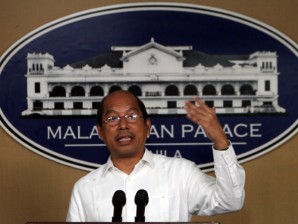P27B pork in 2014 national budget
The pork stays and it’s a whopping P27 billion in the Aquino administration’s proposed P2.268-trillion national budget for next year.
Unfazed by the alleged P10-billion pork barrel scam, the executive branch still opted to include the regular allocation for the Priority Development Assistance Fund (PDAF).
“Unlike in the past when only the ‘soft’ portion was in the budget and the ‘hard’ portion was tucked in” in government agencies, the new budget proposal shows the “whole and complete PDAF,” said Budget Secretary Florencio Abad.
Soft refers to projects involving social services; hard involves infrastructure projects.
“The P27-billion PDAF is provided and that is a special line item for PDAF in this budget,” Abad said when he submitted the national expenditure program to the House of Representatives on Tuesday.
Article continues after this advertisementHowever, Malacañang is considering measures that would subject nongovernment organizations (NGOs) implementing PDAF projects under closer scrutiny by the Department of Social Welfare and Development.
Article continues after this advertisementNGOs accredited by DSWD
“We are still in the process of determining whether our role will be limited only to registration or expanded to include accreditation and licensing (of NGOs),” Social Welfare Secretary Corazon Soliman said in a telephone interview, referring to talks with the Department of Budget and Management.
President Aquino made no mention of the pork barrel scandal on Monday in his fourth State of the Nation Address (Sona), which lasted nearly two hours and tackled other police and corruption scandals under his watch.
The Makabayan bloc earlier filed a bill seeking to abolish the entire pork barrel system in government, including the President’s Social Fund. Bayan Muna Rep. Neri Colmenares urged Aquino to make the bill “irrelevant” by not including the PDAF in the 2014 national budget.
Each senator usually gets P200 million in PDAF every year, while members of the House of Representatives receive P70 million each.
The National Bureau of Investigation is currently looking into allegations by six whistle-blowers that P10 billion in pork barrel funds of five senators and 23 congressmen had been lost over the past decade in ghost projects implemented by dummy NGOs.
P842B in social services
The P27-billion PDAF allocation is no match for the P62.6 billion in cash doles under the conditional cash transfer program (CCT) in the national budget.
The amount was raised from the existing P44-billion budget this year to cover “4.44 million households and 10.2 million children beneficiaries.”
The new amount dwarfs the P21.1-billion budget set aside for the construction of irrigation systems, and the P12-billion allocation for building farm-to-market roads in the proposed national budget.
“We’ve already witnessed the steady and consistent improvement of the country’s economic performance under the Aquino administration,” Abad said. “Now, we’re bringing these successes to bear on the lives of every Filipino.”
In all, “social services” will corner the biggest portion of the proposed national budget at 37.2 percent, or P842.8 billion. The amount represents a 20.5-increase from the P699.4 billion set aside in the current budget.
The CCT took off from the “Pantawid Pamilyang Pilipino Program” first introduced by then President Gloria Macapagal-Arroyo, who is now on her second term as a Pampanga congresswoman.
Expanded CCT coverage
The program has had its share of supporters and critics considering its mechanism that provides P300 or P500 to poor families with a maximum of three children up to age 14, or a total of P1,400 per month.
As recommended by the government think tank, Philippine Institute for Development Studies, the administration expanded the CCT program to include “high school-aged children” from 15 to 18.
“It clearly makes sense from a poverty reduction point of view to make that additional investment on the education of the child to ensure that he/she finishes high school,” according to the institute’s study by Celia Reyes.
“A high school graduate will have more employment opportunities and higher pay. If the program aims only for graduation in the elementary level, and does not provide an effective exit strategy, the possible returns are very minimal to matter.”
The DSWD has been conducting registration, accreditation and licensing of NGOs involved in social welfare services, Soliman said.
The department has even accredited several NGOs as recipients for the “soft” projects of pork barrel funds and that the DSWD has the system in place to cover projects beyond social welfare, she said.
In the registration process, Soliman said the DSWD would immediately filter out fake NGOs. She said the accreditation process was more stringent as NGOs would be required to have working program in place and good governance standards.
Sen. Ralph Recto said he had no objection to the grant of NGO gatekeeper to the DSWD.
“I am open to the idea. The DSWD has performed well. It is correct to have an accreditation process and adopt safeguards on the use of PDAF,” said Recto in a text message.
Originally posted at 05:52 pm | Wednesday, July 24, 2013
